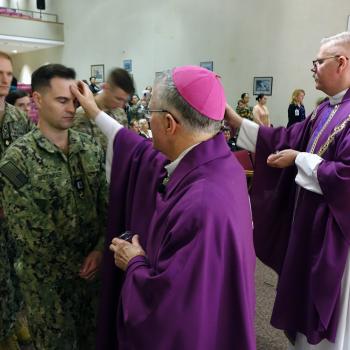The passage from Isaiah shows God's full awareness of the people's stubborn ways. God had tried to get the people to change their ways by accusing them and being angry with them. God was enraged by their sinful greed and punished them by hiding God's face from them. And yet, the passage says, "They kept on in their willful ways." Even God's absence wasn't enough to motivate God's people to change their ways.
Our human propensity to build up walls, to exclude people, to look out for our own interests to the detriment of others is part of what we religious types call "original sin," something we are unable to fix on our own. It is bigger than us and so ingrained in us that no matter what we do, we will never completely eradicate it from our lives.
This isn't an idea that's much in vogue these days. People don't like to be called "sinners." It's so negative. But the point is not to feel bad about ourselves; it is to recognize that we need God. Christians are good at saying that but really poor at actually acting in ways that show that. We practice what has been called "functional atheism." We say we believe in God but yet we act as though we have to save ourselves -- as if we have to do everything to make things right in this world.
But scripture tells us otherwise. In Isaiah, God says: "I have seen their ways, but I will heal them; I will guide them and restore comfort to them, creating praise on the lips of the mourners in Israel. Peace, peace, to those far and near.... I will heal them."
And in the second chapter of Ephesians, just before the lectionary passage, the writer tells us: "For it is by grace you have been saved, through faith -- and it is not from yourselves, it is a gift from God -- not by works, so that no one can boast."
We need God. And once we recognize that fact and ask for God's help, then those barriers and dividing walls will begin to come down. Unfortunately, they don't just drop away immediately and never come back. That whole human sin thing has a way of creeping back in. So we have to be continually mindful of our propensity to put them up.
What can we do to help us be mindful of this? What can we do to allow God to tear down the walls we so easily construct? How can we keep ourselves from so quickly dismissing people?
Prayer is essential! Maybe it's the simple prayer, "Help!" or "God, I need you." Or maybe something like this: "God, please help me to remember that (so and so) is also your child."
Conversation is also vital, for it helps us to learn more about where the other is coming from. We should not enter into this type of conversation with the hope that the other will change and come around to our way of thinking. I'm guessing we've all been the recipients of that type of "conversation" in the past. No, we need to enter into this conversation truly open to the moving of the Spirit -- hoping to gain insights into who this person is and why he or she believes or acts in the ways that are bothersome (or offensive) to us.
When true conversation happens, it can really deepen a relationship, even if both parties involved remain committed to the ideas they originally held. This kind of conversation helps us to remember that "the other" is also a child of God.
But sometimes, conversation is not possible. And in times like those we have to fall back on a saying that we've probably all heard before: We cannot control how other people act; we can only control how we react. In cases like these, maybe all we can do is pray for God's help in changing our reactions so that we do not devalue another of God's children.
God created humans to live in relationship. The creation stories show this to be true. The passage from Genesis comes at the end of the story of how God made man and then made all the other creatures. But in the end, none of these other creatures brought man the companionship that he desired . . . until woman was made. This creature, made from the same flesh, finally met the man's need for relationship -- a relationship so deep, so meaningful that the two became one.
This same wording is used in Ephesians to explain how peoples are brought together. Through the cross, Christ brings people together to be the Church. It is a bond that creates "one new humanity out of the two. . ." Old divisions are put away. Unity in peace is what remains.
God, in Christ, is reconciling us one to another. God offers us peace -- the peace that dispels hostility. Let us be open to receiving that peace. Amen.
Let us pray: God, you are the God of reconciling peace. Come and bring us that peace we pray. Help us to see that all people are your creation, your children. Help us to not be so quick to throw up dividing walls between us and those who annoy or disturb us. Help us to be examples of your reconciling love in the world. All this we pray in the name of your son, Christ Jesus. Amen.
 The Rev. Leslie Veen is Director of Vocational Formation & Placement for San Francisco Theological Seminary and Parish Associate for Mission Bay Community Church.
The Rev. Leslie Veen is Director of Vocational Formation & Placement for San Francisco Theological Seminary and Parish Associate for Mission Bay Community Church.




